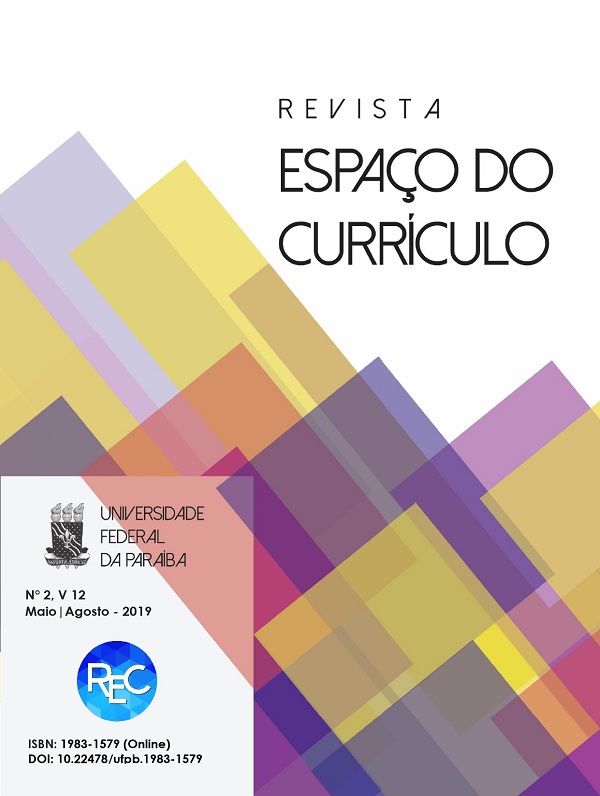THE CURRICULAR ORGANIZATION AND THE HUMAN FORMATION CYCLES IN THE STATE OF MATO GROSSO
DOI:
https://doi.org/10.22478/ufpb.1983-1579.2019v12n2.40724Keywords:
Organization of pedagogical work., Curriculum., Training cycles., Historical-critical pedagogy.Abstract
This article aims to analyze the way in which the curriculum proposal in the state network of Mato Grosso is linked to the policy of organizing pedagogical work based on human training cycles. The fundamentals of historical-critical pedagogy are used, that is, the principle of humanization is taken as the fundamental pedagogical reference, understood as assimilation of the classic elements of human culture. The data presented comes from the documentary analysis of the Curricular Guidelines for the State of Mato Grosso (OC) and the responses of 31 (thirty-one) teachers who answered a questionnaire applied in August 2017, in four (04) schools in the state education network , in the municipality of Cuiabá / MT. Based on this survey, an attempt was made to analyze the relevant conceptual aspects of the curricular proposal, asking about its link to the promotion of humanization, through intentional action aimed at the assimilation of scientific, artistic and philosophical knowledge, an effective form of political commitment that is understood that it must be present in the school organized by cycles of human formation. From the study carried out, it was possible to reveal some weaknesses about the consistency of the official document of curricular reference of the State of Mato Grosso and the links with pedagogical practice.
Downloads
Metrics
References
DUARTE, Newton. Vigotski e o “Aprender a Aprender”: crítica às apropriações neoliberais e pós-modernas da teoria vigotskiana. 2. ed. rev. e ampliada. Campinas, SP: Autores Associados, 2001.
FREITAS, Luiz Carlos de. Crítica da organização do trabalho pedagógico e da didática. Campinas, SP: Papirus, 1995.
GAMA, Carolina N., DUARTE, Newton. Concepção de currículo em Dermeval Saviani e suas relações com a categoria marxista de liberdade. Interface (Botucatu). 2017; 21(62):521-30.
GORODICT, Clarice; SOUZA M.C. O complexo temático. In: SILVA, L. H. (org). Escola cidadã – teoria e prática. 5. ed. Petrópolis: 2004.
KUENZER, Acácia. Z. Ensino Médio: construindo uma proposta para os que vivem do trabalho. São Paulo: Cortez, 2000.
MALANCHEN, Julia. A pedagogia histórico-crítica e o currículo: para além do multiculturalismo das políticas curriculares nacionais [tese]. Araraquara (SP): Universidade Estadual Paulista; 2014.
MARX, Karl. Contribuição à crítica da economia política. Tradução e Introdução de Florestan Fernandes. 2. ed. São Paulo: Expressão Popular. 2008. 288 p.
MATO GROSSO. Secretaria de Estado de Educação. Orientações Curriculares: Concepções para a Educação Básica. Cuiabá: Defanti, 2010a.
______________________________________________. Orientações Curriculares: Área da Linguagem. Cuiabá: Defanti, 2010b.
PISTRAK, M.M. Fundamentos da escola do Trabalho: uma pedagogia social. São Paulo: Expressão Popular, 2011. (Tradução de Daniel Aarão Filho).
PRESTES, Zoia Ribeiro. Quando não é quase a mesma coisa: traduções de Lev Semionovitch Vigotski no Brasil. Campinas, SP: Autores Associados, 2012.
ROCHA, Silvio (Org.). Ciclos de formação: a proposta político-pedagógica da escola cidadã. Coleção Cadernos Pedagógicos SMED, v.9, Secretaria Municipal de Porto Alegre, 1996.
SAVIANI, Dermeval. Escola e democracia. Campinas: Autores Associados, 2008.
__________________. Pedagogia histórico-crítica: primeiras aproximações. 11. ed. rev. Campinas: Autores Associados, 2013a.
__________________. História das ideias pedagógicas no Brasil. 4.ed. Campinas, SP: Autores Associados, 2013b.
VIGOTSKY, Lev S. A Formação Social da Mente. São Paulo: Martins Fontes, 1998.
Downloads
Published
How to Cite
Issue
Section
License
By submitting an article to Curriculum Space Journal (CSJ) and having it approved, the authors agree to assign, without remuneration, the following rights to Curriculum Space Journal: first publication rights and permission for CSJ to redistribute this article. article and its metadata to the indexing and reference services that its editors deem appropriate.
















